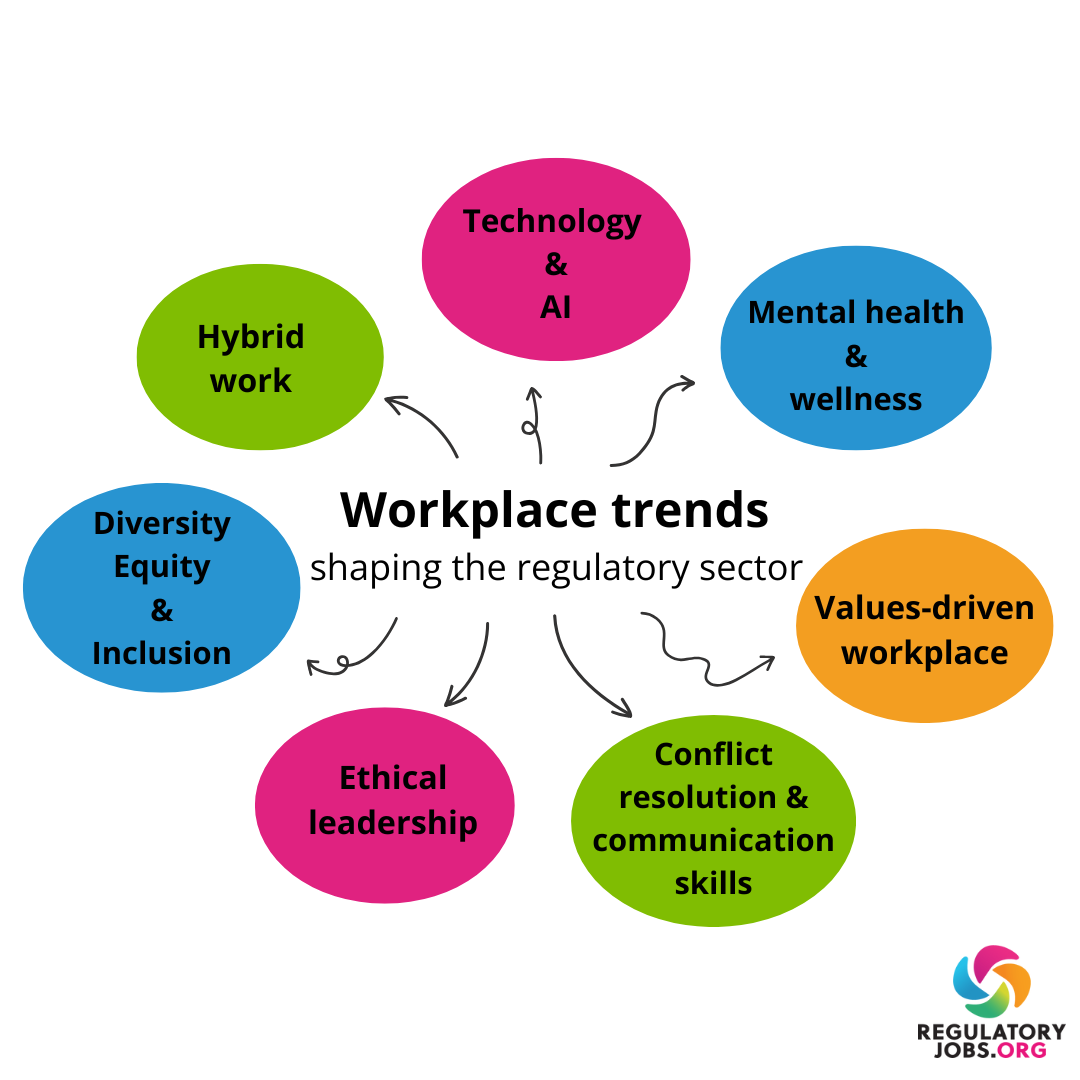As workplaces continue to evolve, regulatory professionals are at the forefront of managing complex challenges and opportunities. Whether you’re a professional working in a regulatory body or considering a career in this field, staying informed about workplace trends helps you think strategically and stay ahead of the curve.
We’ve put together a list of trends shaping all organizations.
The rise of hybrid work
The regulatory sector, like many others, is increasingly embracing hybrid work models. This trend aligns with employees’ demand for flexibility while ensuring operational efficiency. Organizations are investing in robust digital infrastructure to facilitate collaboration and productivity across remote and in-office teams.
This means employers in the regulatory field must balance flexibility with maintaining strong team collaboration while ensuring compliance.
Technology and AI shaping the future of work
Advances in technology and artificial intelligence are reshaping regulatory practices, from automating compliance checks to enhancing data analysis capabilities. AI is also helping streamline recruitment processes and improve decision-making with predictive analytics. For example, AI-powered chatbots or virtual assistants can handle common regulatory inquiries from the public, providing quick and accurate responses and freeing up human staff to address more complex issues.
Regulatory organizations must adopt ethical AI practices, investing in upskilling their workforce to meet new technological demands.
The AI in Licensing and Regulation: Global Perspectives and Local Leadership conference, hosted by MDR Strategy Group on February 11, 2025, in Toronto, will provide an invaluable platform for professionals to exchange ideas, share strategies, and gain actionable knowledge on integrating AI into regulatory practices responsibly and effectively.
Embracing Diversity, Equity, and Inclusion (DEI)
Diversity, equity, and inclusion (DEI) are now fundamental pillars for regulatory bodies striving to stay relevant and effective in a rapidly changing world. As the workforce and the communities they regulate become increasingly diverse, forward-thinking organizations are adopting comprehensive, data-driven DEI strategies.
These include not only inclusive hiring practices and bias training but also the establishment of employee resource groups (ERGs), mentorship programs, and diversity audits. By prioritizing DEI, regulatory bodies can create a more inclusive and dynamic work environment that better reflects the needs and perspectives of the public.
Mental health and wellness are becoming a priority
Workplace wellness has become a critical focus for organizations. With regulators having to navigate tight deadlines, complex decision-making, and public accountability, the risk of burnout and stress-related issues is high. To combat this, employers are increasingly adopting comprehensive wellness initiatives that address mental health, physical well-being, and work-life balance.
Here are ways organizations are incorporating health and wellness:
Flexible scheduling: Allowing employees to tailor their work hours to fit personal and family needs.
Access to counseling services: Providing confidential access to mental health professionals to help employees manage stress and anxiety.
Wellness programs: Offering activities such as mindfulness sessions, fitness classes, and stress management workshops.
Employee assistance programs (EAPs): Providing resources and support for personal or professional challenges.
Emphasis on conflict resolution and communication skills
Regulatory environments often involve high-pressure situations where clear communication and conflict resolution are critical. Training employees and leaders to manage conflicts effectively fosters a more harmonious workplace while enhancing public-facing interactions.
Organizations that prioritize conflict resolution build stronger, more resilient teams capable of navigating complex challenges.
Values-driven workplaces are on the rise
Purpose-driven work is increasingly important to today’s workforce. Regulatory organizations are highlighting their role in protecting public interests and aligning organizational missions with broader societal goals to attract top talent.
Regulatory employers should clearly articulate their impact on society to inspire current and future employees.
Ethical leadership is being prioritized
Ethics and integrity are non-negotiable in the regulatory field. With the rise of complex ethical dilemmas—particularly involving technology and AI—there’s an increased demand for leaders who can navigate these challenges with transparency and accountability. Ethical leadership training is critical for cultivating trust and resilience within regulatory organizations.
The regulatory sector is undergoing profound changes, shaped by broader workplace trends and technological advancements. By staying ahead of these trends, regulatory bodies can create resilient, forward-thinking workplaces that attract top talent and drive meaningful change.
Interested in exploring opportunities in the regulatory sector? Check out Regulatoryjobs.org for latest job listings and career tips!
Are you a recruiter looking to attract top regulatory talent? Visit Regulatoryexecutive.ca.
When you post your job listings on Regulatoryjobs.org, you also get visibility across our social media channels.
Want to learn more about regulatory bodies in Canada or find a regulated professional? Let Regulatoryguide.ca. be your guide!
